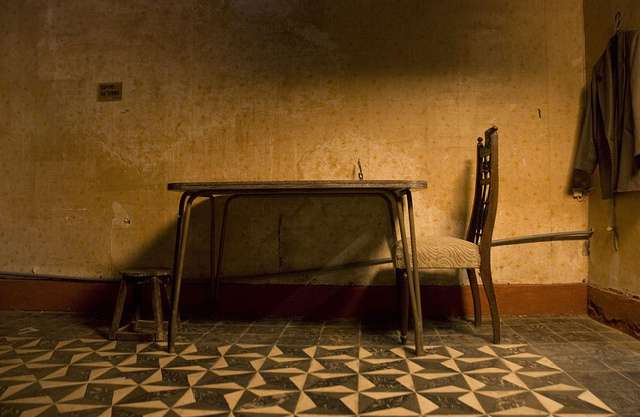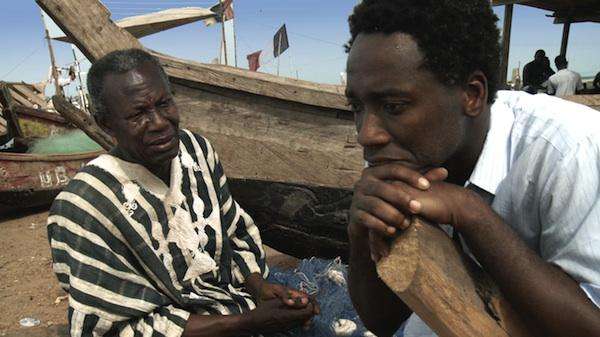-
Vladimir Kott: Gromozeka (2011)
Vladimir Kott: Gromozeka (2011)

POLINA FOLONENKO AND LEINID GROMOV IN GROMOZEKA
Three characters in search of significance
The young Russian director Vladimir Kott has directed three excellent actors in this sophomore effort about three former school buddies dealing with midlife meltdowns. But despite the excellence of the leads and the movie's general competence Kott doesn't achieve the transcendence he seems to be striving for. If he's fumbling toward something like Krzysztof Kieślowski's Dekalog as his succession of characters facing grim life challenges suggests, Kott never quite marshals the depth of writing or the grandeur of overall conception to carry that off, and Gromozeka arouses hopes that it eventually dashes.
In their teens this trio of men whose intertwined narratives form Gromozeka were in a band with that same name. The film is book-ended with a reunion when the three sing with drunken enthusiasm into a video camera and take a sauna together. When they ask each other, post sauna, how they are, they all blissfully, or numbly, say "fine." But that is anything but the case, as the rest of the film shows us. Thirty years after their spirited band days they are, to begin with, in different worlds. More upscale, Eduard (Nicolay Dobrynin) is a surgeon who lacks the courage to tell his grim wife (Darya Semenova), an optician (a job used symbolically) that he’s in love with a younger woman at the hospital. It’s eating away at him; or is he just sick?
At the next level down, which is more humble in Russia, a cop or a cabbie? Well, longtime policeman Vasya (Boris Kamorzin) is about to be demoted because he hasn’t got the stuff to go out on active assignments. And his wife Larisa (Yevgeniya Dobrovolskaya) is having an affair, though he doesn’t know with whom. His son is a thug, though he doesn't really know that either. This is where two of the three plots cross over, because band alumnus number three, taxi driver Mozerov (Leonid Gromov) is so angry when he finds out his daughter (Polina Filonenko) is not a student as she claims but a porn star, he pays the mafia to disfigure her, and the cop’s son is the one sent out. The son refuses to do the job – he recognizes the daughter (lots of people do! she's in the latest Russian porn movies), and some amusing contretemps follow. When Mozerov takes things into his own hands he's almost as grimly buffoonish as one of Nabokov's cardboard villains. And Vasya, who is always posing with a pistol but unable to use one, has a truly Nabokovian moment of clumsy accidental machismo when he tries to punish his wife's lover.
Yes, this is bleak-ish Kieślowski-style essay on life and the fate we choose for ourselves does have sparks of genuine dark humor, as well as touches of supernatural symbolism. But Kott, whose debut The Fly (ND/NF 2009) about a man in the remote provinces who discovers he has an obstreperous 26-year-old daughter, was full of promise, shows here that despite good direction, performances, and cinematography, he’s not, and probably never will be, Kieślowski. Gromozeka lacks Dekalog's profound moral vision, Kieślowski's ability to look deep into the human psyche through intensely specific moments.
There is some energy and suspense in the first half of the movie as we watch to see if the surgeon and cop will man up and the cabbie will find something better to do than victimize his daughter, but the three narrative lines, however smoothly edited together, just dig the men deeper in dirt in the second half, and the musical bookend is merely an escape from the lack of resolution. As for the women, they are depicted as an unpleasant lot -- whores, cuckolds, or just mean and frigid. No wonder the only child in sight is a hoodlum. But should he really be the only fellow with cojones and a code?
Shown in competition at the Rotterdam Film Festival. In Russian. 103min. Seen and reviewed as part of New Directions/New Films, presented March 23-April 4, 2011 by MoMA and the Film Society of Lincoln Center, New York.
ND/NF screenings:
2011-04-01 | 6:00 PM | MoMA
2011-04-02 | 3:45 PM | FSLC
Last edited by Chris Knipp; 08-09-2014 at 01:34 PM.
-
Daniel and Diego Vega: Octubre (2010)
Daniel and Diego Vega: Octubre (2010)

CLEMENTE'S 'OFFICE' IN OCTUBRE: CLIENT'S SEAT ON THE LEFT, HIS ON THE RIGHT
A reluctant father in a month of miracles
In this fully realized if slow-to-charm debut, the Vega brothers take us into a world of Lima that seems initially as dark as Pablo Larraín's Seventies Buenos Aires. Their protagonist is almost as dry and inhuman as the characters played by Alfrado Castro in Larraín's successive films, Tony Manero and Post Mortem. But Octubre focuses on a month of miracles and forgiveness, a middle-aged lady who lights candles and bakes sweet pastries, and a found baby girl who is rescued and thrives. At the center of things is a ghetto money lender with a heart of granite, a hard black pompadour, and a tendency to get prostitutes pregnant. He is going to change, though unwillingly, and only a little.
The middle-aged Clemente (Bruno Odar) has the dignity of a fading peacock, and everyone knows him as "the pawnbroker's son," even if his father is long gone. He lends money at high interest, and his office is as bleak as, and part of, his rudimentary house. He is mean, and deeply trained so, but the worst he does if a client doesn't pay on time is break a window pane. There's nothing in his life otherwise, no real friends, and when someone breaks into his house and leaves a baby in a basket he receives this event with scant enthusiasm. But he keeps the girl, holding it like a rag doll while seeing clients. This can't last, obviously.
This is when Sofia (Gabriela Velasquez), a motherly spinster in the neighborhood, comes in. Clemente hires her to come over and take are of he baby. This is ostensibly to give Clemente time to go looking for the mother, which involves trying, with comic lack of success, to pass a forged banknote he took because "it" (the baby) distracted him, and visiting various prostitutes, and finally getting roughed up by a cabbie he's rude to. Meanwhile Sofia has moved in, and even winds up sleeping in Clemente's bed at times. She goes on baking cakes for the local deli and participating in lottery discussions and the week-long October religious procession -- the real one is filmed -- that is a feature of the month of October, the "purple" month of miracles -- in Lima. She names the baby "Milagros," miracle.
Bruno Udar, as Clemente, anchors the piece with his deadpan puss and dry line deliveries. Eventually though the film avoids either buffoonery or excessive sweetness, it shows Clemente turning into something more of a human being. The naturalness of Gabriela Velasquez is an important element too, and all the actors read as authentic, particularly a couple of the clients and Clemente's plump, glasses-wearing favorite prostitute, who qualifies almost as a friend. A running subplot is of an old man who is finagling to get his chronically ill girlfriend out of a hospital ward into his house. We get to see, briefly, plenty of Clemente's clients.
When I said this is slow-to-charm I meant it has not quite begun to charm me yet. For one thing Fergan Chavez-Ferrer's lighting is so dim and his cinematography is so cold (though composed with great precision) that the picture takes a long time to draw you in. The "happily ever after" consists of the fact that Clemente tries to throw Sofia out, but she stays. Ultimately his scant enthusiasm is, after all, still enthusiasm. The prayers to the Land of Miracles that are a feature of Octobers in Peru have had their effect. One French reviewer compared the protagonist to Ebenezer Scrooge, but his transformation is nothing like as dramatic as Scrooge's. It's almost invisible. He remains a character who's hard to like; but he has also failed to exhibit quite a Scrooge-like cruelty. The Vega brothers have kept their charm and sweetness tart, learning by their own admission their lessons from Kaurismäki, Jarmusch and Bresson. They've also mentioned Uruguayan director Juan Pablo Rebella's Whisky as a work they admire.
Octubre was featured at Cannes in the Un Certain Regard series, winning the President of the Jury Prize, and got three other nominations. It has since been in many festivals internationally. It was released in Paris December 10, 2010. Reviews were moderately good, public response less warm. Cahiers du Cinéma thought the brothers adhered too strictly to a fixed notion of what's auteurist, and I felt that too. Whether the Vega brothers themselves will emerge as distinctive stylists still remains to be seen, but their work as anointed by Cannes is guaranteed a place on the festival circuit. Seen and reviewed as part of the New Directors/New Films series, presented by MoMA and Lincoln Center from March 23 through April 4, 2011.
Octubre got a limited US theatrical release beginning May 6, 2011.
ND/NF screenings:
2011-04-02 | 9:00 PM | FSLC
2011-04-03 | 4:00 PM | MoMA
Last edited by Chris Knipp; 05-05-2011 at 10:20 AM.
-
Deron Albright: The Destiny of Lesser Animals (2011)
Deron Albright: The Destiny of Lesser Animals (2011)

YAO B. NUNOO (RIGHT) IN THE DESTINY OF LESSER ANIMALS
In quest of identity, and a fake passport
The Destiny of Lesser Animals (Sibo ne kra, Dabo ne kra), from Ghana, by a director from Philadelphia via the Midwest, is an earnest and well-meaning but unconvincing effort about becoming reconciled to one's homeland. This debut feature follows Boniface Koomsin (Yao B. Nunoo, who wrote the screenplay), a police inspector through a meandering, talky odyssey that starts with trying to leave Ghana and ends with deciding to stay and raise a beggar girl. Boniface was barred from the US for assaulting local police around the time of the 9/11 attacks. He is convinced his future is there, and so a decade later he is planning to return by using an expensive fake passport. Unfortuantely as soon as he picks up the passport it's stolen from him. For the rest of the film he goes looking for it pretending he's lost his police pistol and is in search of that.
When he gets to "where the money is," Accra, he runs into Chief Inspector Oscar Darko (Fred Amungi). Darko is on an armed robbery case and Boniface becomes convinced the perpetrators also nicked his fake passport. This leads the two of them to a casino hostess, Serwah Bimpong (Abena Takyi), but it's a dead end. On the way to the grave of his father, whom he often addresses in voice-over, Boniface runs across a seemingly mute Beggar Girl (Xolasie Mawuenyega) who for some reason fascinates him. Back at the casino, Boniface has a violent confrontation. An attack on an American leads Boniface and Darko back to Serwah, who fingers a drifter named Yaro.
Eventually Boniface confesses to Darko the true nature of his search and Oscar throws him off the assault and robbery case, and later he's evicted from the force. The final scenes show Boniface seeking out the Beggar Girl, who's gone missing, and eventually finding her and taking her home, hoping to send her to school. The outcome of his rambles is that he has decided his mission is to remain in his home country and, presumably, raise some kind of family.
Yao B. Nunoo, the writer/main actor, is handsome and soulful but his screenplay is more well-meaning than successful. We get the idea. His protagonist needs to realize that his place is in Ghana, not the USA. But this detective story turns into a feeble wild goose chase that never makes much sense. It's just a series of red herrings. After all, the investigation Boniface goes on with Chief Inspector Darko is never proven to have anything directly to do with his stolen passport. Besides that, going off his duties to run around looking for a fake passport is not a good idea in the first place. The Beggar Girl has nothing to do with any of this. It's just something for Boniface to focus on when his useless search peters out. The film is a series of one-on-one conversations. Despite some actual running by Boniface/Yao at the outset, there is little variety to the action.
This film is the fruit of a year that director Albright spent in Ghana recently on a Fulbright research grant. Albright is an associate professor of film/media at St. Joseph's University in Philadelphia. His 2006 short film, The Legend of Black Tom, has played at festivals and won awards. He has also worked in television.
87 min. In Fante, English, Pidgin, Twi, and Ga with English subtitles. The HDCAM cinematography is serviceable and the film provides views of the Ghanan urban landscape.
Seen and reviewed as part of New Directors/New Films, presented March 23-April 3, 2011 by MoMA and the Film Society of Lincoln Center, New York.
ND/NF screenings:
2011-04-01 | 9:00 PM | MoMA
2011-04-02 | 6:30 PM | FSLC
-
Athina Rachel Tsangari: Attenberg (2010)
Athina Rachel Tsangari: Attenberg (2010)

EVANGELINA RANDOU AND ARIANE LABED IN ATTENBERG
Sex and death and primate observation
From the producer of Dogtooth comes this hip, Nouvelle Vague-influenced and largely insufferable study of a dying man and at a Greek town on the sea and his daughter's belated and self-indulgent introduction to sex. The younger man who assists in this introduction is remarkably patient with the young woman's incessant talkiness and gaucherie; indeed the dying man, reputedly an innovative architect, is remarkably patient with his daughter as well. We should be so patient. Giorgos Lanthimos' Dogtooth, which has been much admired, was highly annoying and self-conscious like this film too, but its schtick succeeded, if you didn't look too close, anyway, because of its boldness and conceptual force. The idea of adult children so isolated from ordinary life they can be fed a whole new vocabulary and set of concepts is arresting and thought-provoking, despite its artificiality.
But here Tsangari, as Howard Feinstein wrote recently in a roundup of the New Directors/New Films 2011 series in Filmmaker magazine, has produced an "overly studied" film, most glaringly so in its constant inserts of symmetrical travelling shots of two young women walking arm and arm up and down a crunchy stone pathway kicking their feet in the same direction. What do these sequences mean? They mean that this is semi-feminist in its outlook, perhaps. But most of all they mean this is an art film and doesn't want you to forget it.
Attenberg is an intentionally sui generis spelling of the family name of Sir Richard Attenborough, whose intimate filming of gorillas (as dangerously up-close as Herzog's Grizzly Man) is glimpsed on the Tube, and alternates with a man and woman jumping up and down on a bed doing a passable imitation of a pair of very animated primates. A young woman also screeches like a bird while lying on a bed watching an unseen nature film, perhaps also by Attenborough. The implication is that the film examines human behavior with the detachment of an observer of animal life. This is not a claim that is justified by the film itself.
Towards the end, the film shifts to a focus on arrangements for the architect's cremation. The process cannot legally be performed in Greece, so the family must pay to have the body sent abroad, incinerated, and then returned in an urn. A scene in which the daughter makes arrangements for all this at a posh commercial establishment is rather droll, and perhaps authentic. The final boat trip with the urn when the ashes are sifted into the sea has a certain stern beauty. Not everything in Attenberg, then, is totally annoying. Obviously Tsangari is sophisticated and confident as a filmmaker, as is her colleague Lanthiomos. The Variety review of Attenberg by Boyd van Hoeij ( written when the film debuted at Sundance this January) calls this an "impressive" sophomore effort and explains for us that its purpose is to show how "The opposing yet strongly connected forces of Freudian buddies Eros ('passionate love') and Thanatos ('death') " are "reluctantly explored" by the "femme protagonist." Yes and of course Eros and Thanatos are Greek words and this is a Greek film. The Variety review also explains to us that some of the more manic and absurd on screen antics are explained as the way "while people intimidated by or frustrated with human social constructs revert to animalistic behavior." Van Hoeij concludes that Attenberg "certainly works as a wacky, decidedly arthouse coming-of-age narrative." Wacky and decidedly arthouse it certainly is, but "works"? It "works" if its self-indulgent mannerisms appeal to you and the Eros-Thanatos themes seem to you to cohere with the arch animal-observation theme.
The film features Ariane Labed as the daughter, Giorgos Lanthimos as the dying architect father, Vangelis Mourikis as the willing sexual initiator, and Evangelia Randou as the daughter's friend who teachers her to tongue-kiss and struts up and down the stone path with her.
Seen and reviewed as part of the New Directors/New Films series presented March 23-April 3, 2011 by the Film Society of Lincoln Center and the Museum of Modern Art, New York.
ND/NF screenings:
2011-03-31 | 6:00 PM | MoMA
2011-04-02 | 1:00 PM | FSLC
Last edited by Chris Knipp; 03-24-2011 at 04:41 PM.
-
New Directors/New Films: A Roundup
New Directors/New Films: A Roundup

STILL FROM MARYAM KESHAVARZ'S CIRCUMSTANCE (NOT COVERED IN MY REPORTS)
NEW DIRECTORS/NEW FILMS 2011: A ROUNDUP
There are a few outstanding films this year, and a number of ones that show the directors have talent and should be watched. Then there are some uncertain cases. And some strong differences of opinion at screenings. I also missed some.*
Bogdan George Apetri's OUTBOUND
An intense, non-stop Romanian story about a young woman released from jail for one day. Its powerful ending evokes the great Italian neorealists. This is a pretty nearly flawless film, which follows the current Romanian style of focusing on a minute-to-minute saga.
J.C. Charndar's MARGIN CALL
A fresh, elegant look at the beginning of the Wall Street financial meltdown by a new American director, featuring Kevin Spacey and Jeremy Irons. It all happens in a dark steel-and-glass box but it's quite cinematic nonetheless.
Denis Villeneuve's INCENDIES
A powerful, visually rich look at a personal family heritage of Middle Eastern confict. The director is a French Canadian, whose films have four times been nominated for the Best Foreign Oscar. From a stage play but the realization is thoroughly cinematic.
Paddy Considine's TYRANOSAUR
A brilliant, harrowing portrait of English violence and alcoholism with all the focus on the superb acting. Peter Mullan is the star, with Olivia Colman. You may want to look away but you cannot.
These are the standouts. They have some flaws. Margin Call could be more engaging; it's a little too dry at times. Incendies is far-fetched; its mashup of nationalities and history may seem absurd to some from the region and its surprise final revelation strains the credulity of anyone. Tyranosaur's ugliness and violence are over the top and so it can't be recommended to the faint of heart. Outbound seems best overall precisely because it doesn't have any single notable flaw.
Notable or promising
At another level are some movies that showed a high level of competence or promise. Dee Rees' Pariah, a young black lesbian coming-of-age story, has some beginner's flaws but is warm and colorful, one of the most enjoyable of the series. Ahmad Abdalla's Micorphone, the musical mélange about Alexandria, Egypt, is also enjoyable, if rambling. Fukada's Hospitalité is very clever; this Japanese writer-director has it all together, but his film degenerated into silliness; one hopes his brilliant films come to have a bit more warmth and depth. Anne Sewitsky's Happy, Happy is an adultery comedy (from Norway) that's quite funny but a bit too condescending toward its characters. Göran Hugo Olsson's Black Power Mixtape has a wealth of new footage about the Sixties and Seventies. It may add little that's new to our basic fund of knowledge of the period, but it may yet be new for and fresh for a younger audience. The Vega brothers from Peru, whose Octubre was shown, seem already well established on the festival circuit, with a slightly derivative dry stylishness to which they have added a tiny dab of uplift. They have a style; time will tell if it's their own.
I was not enthusiastic about the French films. Copacabana, with Isabelle Huppert and her daughter, which I reviewed last year, seems lackluster, Huppert doing an "eccentric" shtick that ill-suits her. Mikhael Hers's Memory Lane, a generational reunion, is unfocused and slight. People differed on Rebecca Zlotowski's Belle Épine. I can grant that this dark girl's coming-of-ager shows promise and originality, not that the film makes any sense. People also differed on whether the searing Tyrannosaur can be recommended. I'd warn people about its ugliness and violence, but it's far too masterful not to be warmly endorsed.
Arabic language films were well represented, with four if you count Incendies, which has a lot of Arabic dialogue though it's French Canadian. Besides Microphone, there was another engaging Egyptian film, Mohamed Diab's Cairo 678, and Sameh Zoabi's mild-mannered Palestinian entry, Man Without a Cell Phone. Cairo 678 was the best received, but I found Microphone enjoyable and it was a prize-winner in the Arab world.
I will draw a veil over a few entries that were lackluster or seemed mere stylistic exercises. One can still see why they might have been included because they had previous festival champions, not totally deluded, or they fill some niche. Other films in the series didn't quite come together, but the filmmakers are worth watching.
I missed the new Iranian director Maryam Keshavarz's Circumstance, which is highlighted as the closing night film. It depicts two young women going to parties and listening to outlawed music and beginning to "explore their true feelings for each other." Several people told me this was one of the best, so I wish I'd seen it. My world was rocked anyway a couple of times, I enjoyed myself, and I became acquainted with the work of a lot of interesting new directors and several, like Denis Villeneuve, whom I ought to have known about already.
*ND/NF selections I did not see or did not review:
Circumstance (Maryam Keshavarz 2010, Iran)
El Velador (Natalia Almada 2010, USA/Mexico)
Shut Up Little Man! An Audio Misadventure (Matthew Bate 2010, USA)
Some Days Are Better Than Others (Matt McCormick 2010, USA)
Summer of Goliath (Verano de Goliat Nicholás Pereda 2010, Mexico)

.
.
.
[Subway ad for the New Directors/New Films series 2011].
A.O. Scott's introduction to the series, "Modest Methods, Big Ambitions," appeared in the NY Times today (March 23, 2011) as the series begins public screenings at MoMA and the Walter Reade Theater at Lincoln Center.
INDEX OF LINKS TO ALL FILMLEAF ND/NF 2011 REVIEWS:
At Ellen's Age (Pia Marais 2010)
Attenberg (Athina Rachel Tsangari 2010)
Belle Épine (Rebecca Zlotowski 2010)
Black Power Mixtape: 1967-1975, The (Göran Hugo Olsson: 2011)
Cairo 678 (Mohamed Diab 2010)
Curling (Denis Côté 2010)
Destiny of Lower Animals, The (Deron Albright 2010)
Gromozeka (Vladimir Kott 2011)
Happy, Happy (Anne Sewitsky 2010)
Hit So Hard (P. David Ebersole 2011)
Hospitalité (Koji Fukada 2010)
Incendies (Denis Villeneuve 2010)
Majority (Seren Yüche 2010)
Man Without a Cell Phone (Sameh Zoabi 2010)
Margin Call (J.C. Chandor 2010)
Memory Lane (Mikaël Hers 2010)
Microphone (Ahmad Abdalla 2010)
Octubre (Daniel, Diego Vega 2010)
Outbound (Bogdan George Apetri 2010)
Pariah (Dee Rees 2010)
Tyrannosaur (Paddy Considine 2010)
Winter Vacation (Hongqi LI 2010)
©Chris Knipp 2011
Last edited by Chris Knipp; 08-09-2014 at 01:35 PM.
 Posting Permissions
Posting Permissions
- You may not post new threads
- You may not post replies
- You may not post attachments
- You may not edit your posts
-
Forum Rules





 Reply With Quote
Reply With Quote





Bookmarks